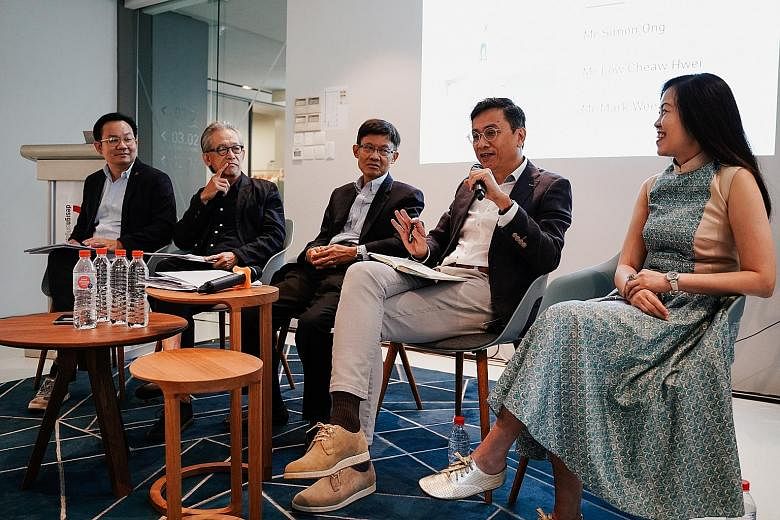The institutes of higher learning (IHLs) here are set to infuse a wider appreciation of design into their curriculum at a time when job scopes are changing and demand is rising for people with design skills.
The word "design" has expanded to take on new meaning - it does not involve merely shaping how things look, such as interior design or landscaping, but also how things work, said Mr Mark Wee, executive director of the DesignSingapore Council.
"There is a whole other realm of what we call 'experience making'. Within that, you start to see new disciplines like interaction design - how digital systems interact with physical systems, how we design interfaces and how they work well."
He was speaking to The Straits Times yesterday on the sidelines of a briefing by the Design Education Review Committee, which laid out five recommendations to enhance existing design programmes in the IHLs and embed design in their non-design programmes.
"Design is also about business strategies and user experience, about creating new products for markets that can be (economically) desirable," said Mr Wee, who is a member of the review committee.
Apple can be seen as a design-centric firm, for instance, because it puts thought into factors such as the physical layout of its stores and the user interface of its phones, which have helped to build its brand.
Speaking on the importance and power of design, Mr Wee cited a study last year by business management consultancy McKinsey on the value of design which found that there is a strong correlation between how good a company is at design and how well it performs.
The first of the committee's recommendations is to set up a separate committee comprising key industry leaders and IHL representatives, among others, to strengthen industry links such as building overseas networks or introducing collaboration opportunities.
The second is to give students across more disciplines - such as engineering, business and infocomm media - more opportunities to come together and pick up design-led creative thinking skills.
The third is to enhance training programmes to support both design professionals and educators, or trainers. This includes helping educators keep up to date with industry trends so they can adjust their teaching methods or content, and providing more study awards for professionals and educators.
The committee also recommended that real-world design learning platforms be created for professionals. For a start, a School of X programme will be piloted.
Mr Wee called it a "design studio" involving projects hosted by an institution or agency that challenges participants to solve problems.
The last recommendation is in the area of lifelong learning - empowering the public to learn about design through modular courses and learning communities.
The DesignSingapore Council - Singapore's national agency for design - comes under the purview of the Economic Development Board.
These recommendations follow a two-year review, and the Ministry of Trade and Industry said yesterday that it has accepted them in full.
Senior Minister of State for Trade and Industry and Education Chee Hong Tat said: "Besides being an industry on its own, design can also help to encourage innovation and improve productivity across different sectors. It is a useful enabler in our economic transformation journey."
App to enhance patient care
Patients' hospital experiences could be improved further if there is an application that consolidates their care plans and enables the information on their needs to be shared across different carers and settings, with the patients' consent.
Staff at Alexandra Hospital exploring the idea say such an app may help elderly patients after they have been discharged and as they are cared for at home.
The idea is one of several being explored as part of a School of X pilot programme.
At Alexandra Hospital, staff are being challenged to find a model where patients are cared for by a single team within the hospital, and their post-discharge care is integrated with the community.
A three-day workshop was held in October last year. It was attended by 30 participants, including staff from the hospital's care team and community partners.
Mr Lim Cher Wee, who is chief operating officer of the Health Ministry's Office for Healthcare Transformation, said of the idea behind the app: "This can allow care teams in the community to better coordinate holistic care that is appropriate to the patient's needs."
The current practice, he said, can be complex as it involves different teams. "Healthcare is a complex human-centred practice, delivered one patient at a time," said Mr Lim.
"It is important to take in the voices of patients and their communities, as they are often in a position to describe their care needs, and imagine ideas that can help address such needs."
There may also be underlying social or functional factors that cause an elderly patient to be admitted into hospital, he said. For example, a patient could have been injured from a fall at home because he had no caregiver.
"We want to look at the patient from a 'whole-of-person' perspective, not just a clinical or medical perspective, and address the root causes more than the symptoms," said Mr Lim.
The School of X programme was proposed by the Design Education Review Committee to support a recommendation it set out yesterday on creating more real-world design learning platforms for professionals.
The committee made four other recommendations yesterday: Strengthening industry links, giving students more trans-disciplinary opportunities, enhancing training programmes and empowering the public to learn about design.
The recommendations aim to enhance existing design programmes at institutes of higher learning and embed design in their non-design programmes.


